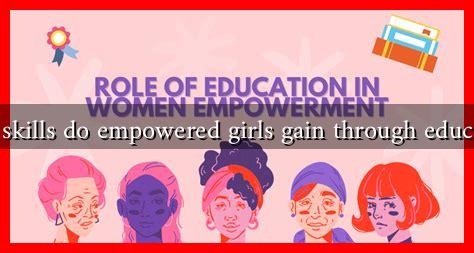-
Table of Contents
What Skills Do Empowered Girls Gain Through Education?
Education is a powerful tool that can transform lives, particularly for girls in developing and developed countries alike. When girls are empowered through education, they gain a multitude of skills that not only enhance their personal development but also contribute to their communities and societies at large. This article explores the various skills that empowered girls acquire through education, supported by relevant examples, case studies, and statistics.
Critical Thinking and Problem-Solving Skills
One of the most significant skills that girls gain through education is critical thinking. Education encourages girls to analyze information, question assumptions, and develop their own opinions. This skill is essential for navigating the complexities of modern life.
- Case Study: The Girl Effect – The Girl Effect is a global movement that highlights the potential of girls to change the world. Through education, girls learn to think critically about their circumstances and the societal norms that affect them.
- Statistics – According to the World Bank, every additional year of schooling can increase a girl’s future earnings by up to 20%.
Leadership and Communication Skills
Education empowers girls to take on leadership roles and communicate effectively. Through group projects, presentations, and discussions, girls learn to express their ideas confidently and lead their peers.
- Example: Girls’ Leadership Programs – Programs like the Girls Leadership Institute provide girls with the tools to become effective leaders. Participants learn negotiation, public speaking, and conflict resolution skills.
- Impact – A study by the Malala Fund found that girls who receive leadership training are more likely to pursue careers in politics and community service.
Financial Literacy and Economic Empowerment
Education also equips girls with essential financial literacy skills. Understanding budgeting, saving, and investing can significantly impact their future economic stability.
- Example: Microfinance Initiatives – Programs like Kiva provide microloans to women entrepreneurs, enabling them to start businesses and become financially independent.
- Statistics – The United Nations reports that when women have access to education and financial resources, they reinvest 90% of their income back into their families and communities.
Health Awareness and Well-Being
Education plays a crucial role in promoting health awareness among girls. Knowledge about reproductive health, nutrition, and mental well-being empowers girls to make informed decisions about their bodies and health.
- Case Study: The Global Health Initiative – Programs aimed at educating girls about health issues have led to decreased rates of teenage pregnancies and improved maternal health outcomes.
- Statistics – According to UNESCO, educated women are 50% more likely to seek healthcare for themselves and their children.
Social Awareness and Advocacy Skills
Empowered girls become advocates for social change. Education fosters a sense of social responsibility and awareness of global issues, enabling girls to engage in advocacy efforts.
- Example: Girl Up Campaign – This initiative encourages girls to advocate for gender equality and women’s rights globally, providing them with the skills to mobilize their peers and communities.
- Impact – Girls who participate in advocacy programs often report increased confidence and a stronger sense of agency in their communities.
Conclusion
In conclusion, education is a vital catalyst for empowering girls and equipping them with essential skills that can transform their lives and communities. From critical thinking and leadership to financial literacy and health awareness, the skills gained through education are invaluable. As we continue to advocate for girls’ education worldwide, it is crucial to recognize the profound impact it has not only on individual girls but also on society as a whole. By investing in girls’ education, we are investing in a brighter, more equitable future for everyone.
For more information on the importance of girls’ education, visit UNICEF’s Girls’ Education page.

